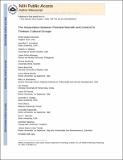| dc.contributor.author | Kirby Deater-Deckard, Jennifer E Lansford, Patrick S Malone, Liane Peña Alampay, Emma Sorbring, Dario Bacchini, Anna Silvia Bombi, Marc H Bornstein, Lei Chang, Laura Di Giunta, Kenneth A Dodge, Paul Oburu, Concetta Pastorelli, Ann T Skinner, Sombat Tapanya, Liliana Maria Uribe Tirado, Arnaldo Zelli, Suha M Al-Hassan | |
| dc.date.accessioned | 2020-08-06T08:43:30Z | |
| dc.date.available | 2020-08-06T08:43:30Z | |
| dc.date.issued | 2011-10 | |
| dc.identifier.citation | 134 | en_US |
| dc.identifier.uri | https://repository.maseno.ac.ke/handle/123456789/1872 | |
| dc.description | The article can also be accessed via URL;https://www.ncbi.nlm.nih.gov/pmc/articles/PMC3192230/ | en_US |
| dc.description.abstract | The goal of the current study was to investigate potential cross-cultural differences in the covariation between two of the major dimensions of parenting behavior: control and warmth. Participants included 1421 (51% female) 7- to 10-year-old (M = 8.29, SD = .67 years) children and their mothers and fathers representing 13 cultural groups in nine countries in Africa, Asia, Europe, the Middle East, and North and South America. Children and parents completed questionnaires and interviews regarding mother and father control and warmth. Greater warmth was associated with more control, but this association varied widely between cultural groups. | en_US |
| dc.publisher | American Psychological Association | en_US |
| dc.subject | : socialization, parenting, parent-child relations, culture | en_US |
| dc.title | The association between parental warmth and control in thirteen cultural groups. | en_US |
| dc.type | Article | en_US |

